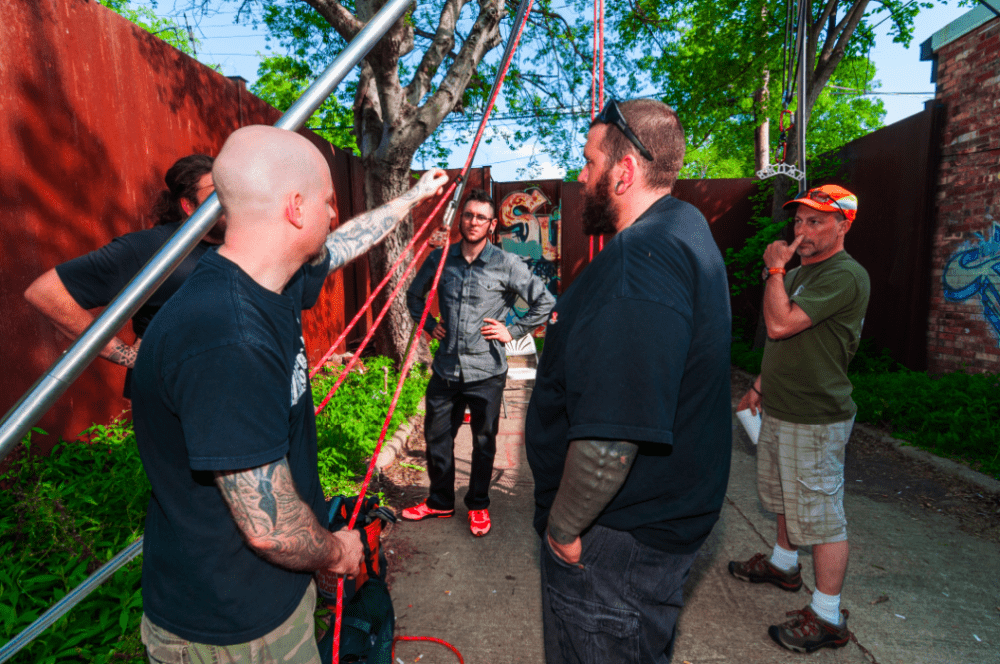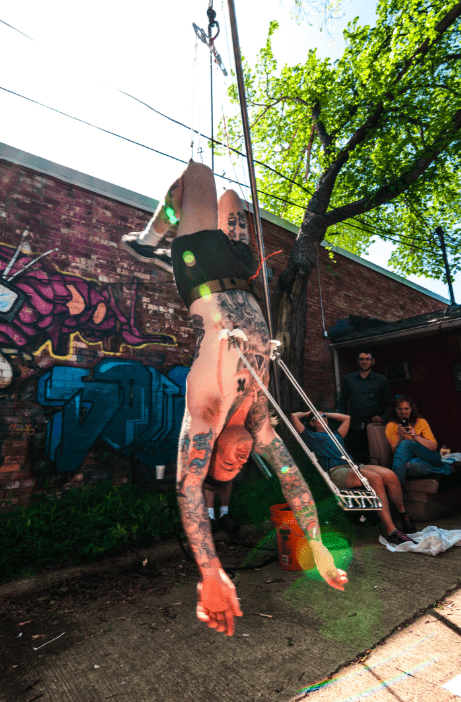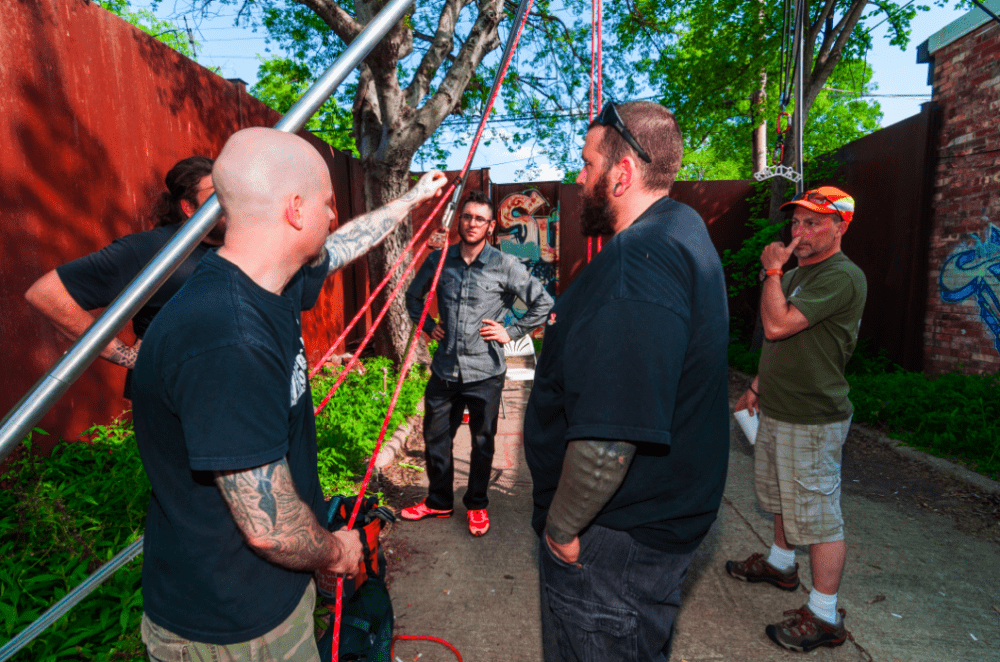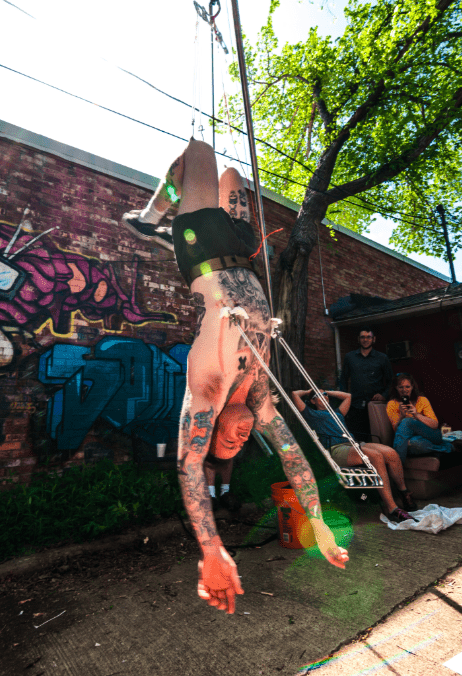
“Agen On” finds his center while swinging. (Courtesy of Mark Kaplan)
It’s a recent night in Reno’s Chop Shop. Two shirtless men walk on to the stage. Across their backs are hooks driven clean through the skin. The men hook themselves up to swinging apparatuses and hang there to cheers. Their stretched skin reddens under the lights.
The hanging men are swung towards the crowd – scowling, spinning, and throwing candy. Thrash metal music plays in the background at the Deep Ellum club. The band Hostile ends their song “Psycho” as the men are pulled down and taken off the stage. Surely they’re in pain, no?
“I feel like dancing!” says Robert Rubio, one of the hanging men and member of Imagine Suspension.
Suspension is the act of piercing one’s skin via hooks and hanging from custom rigs, and practitioners believe that it is one of the area’s largest subcultures. There are several groups in the Dallas area, ranging from 10 to 25 members. They practice suspensions in clubs, warehouses, and sometimes even in private homes. Some groups perform for the public.
Those new to the practice are invited to observe the activity before participating, said Allan Falkner, leader of Traumatic Stress Discipline, or TSD.
“My whole thing about suspension is safety and education,” says Falkner, who started Traumatic Stress Discipline in Dallas in 1992 with a group of friends.
“When people would ask us why we did it, we would say ‘for shits and giggles,'” says Falkner with a shrug. “Now that it’s like a giant international community is bizarre.”
Falkner estimates that roughly 2,000 people practice suspension internationally.
Those who suspend say it’s therapeutic.
“It’s excruciating and amazing and a whole bunch of stuff at the same time,” says Mark Kaplan, a TSD member. “And when I’m done, I feel like I can take on the whole world.”
Suspension has its origins in the Hindu festival Thaipusam. The Tamil people would suspend themselves as part of vel kavadi, a form of worship to the war god Murugan. The practice was later revived in the 1960s when American performance artist Fakir Musafar incorporated suspensions into his act.
Allen Falkner was one of Musafar’s first disciples. People who suspend cite various reasons for doing so, including control and overcoming one’s fears. Falkner has his own theory.
“I do this lecture on what I call ‘the box generation,” says Falkner, who owns the Dallas laser tattoo removal shop Fade Fast. “We live in boxes, we get information out of a box, and we eat out of a box. Everything in life is just pre-packaged for us, especially if you live in the city.”
Suspension allows people to step out of their comfort zone, Falkner said, comparing it to riding a rollercoaster for the first time.
“When people do suspension, they get new experience,” says Falkner. “I feel the more I’ve been involved with suspension, the more alive I feel, the more connected I feel – not only to the people around me, but the environment as well.”
The average person must wonder how skin can support the weight of one’s body. Shouldn’t it just rip? Actually, it’s quite safe. Hooks are inserted under the skin and into the subcutaneous fatty tissue, a thick slab of flesh.
“Your skin is much more resilient and you have a lot more tensile strength than you think,” says John Eaves, a TSD member who has yet to suspend due to nerves. Eaves said that people who do suspend spend little time in treatment for their wounds.
“Nobody’s limping around, or being very ginger when they’re hugging each other,” says Eaves.
“Suspensions hurt. If anyone tells you suspension doesn’t hurt, they’re feeding you a line. It hurts,” says Falkner. “But once your body gets past the pain, once your body produces the endorphins, it no longer hurts anymore. It’s actually kind of a rush.”
TSD and Falkner founded Suscon, a suspension convention, in 2001 to educate younger groups about best practices, as well as to promote a positive perception of the culture. The convention is held in Dallas every March.
Groups who have attended Suscon regard Falkner as the godfather of modern-day suspension.
“If it wasn’t for TSD, the community wouldn’t be as safe as it is,” says Richardson, founder of the group Imagine Suspension. “I have mad love for Allen Falkner.”
Suscon was later disbanded, but started again in 2009 after unsafe practices led to a severe accident at the 2008 South Florida Tattoo Expo. Performer Jimmy Pinango fell to the ground from 12 feet in the air at the Deerfield Beach Hilton. The accident provided an opportunity to bring the suspension community together, says Falkner.
Figures in the community criticized Falkner for resuming Suscon, arguing that sharing information with amateurs is dangerous.
“On the other hand, if we don’t release information or education, at least responsibly, then we’re doing a disservice,” says Falkner. “Whenever I see an accident, I feel at least somewhat responsible, because the education is out there.”
Stitches are rarely needed in his group meets, says Falkner.
Accidents can paint a negative picture of an already controversial hobby. Some practitioners are careful to keep their suspending a secret.
Dixie, who declined to give her real name, hides her hobby from her children.
“Child courts just don’t understand it,” Dixie said, who works as a freelance artist. “So our kids don’t see it, we don’t talk about it.”
Others draw pride from sharing their stories with people outside of the community.
“I sit there and show them pictures of what I did last night,” says Ashley Wycough, a 26-year-old member of Imagine Suspension. “Like, ‘Oh, look at those crazy scars!”
TSD member Kristen Ellis, 26, claims suspension helps her focus in other aspects of life as well.
“Everything has policy and procedures,” says El
lis. “You have to pay attention to what you’re doing, otherwise things can go wrong.”
TSD promotes safe suspensions with a tutorial held a once a month at Fade Fast. Members are assigned various roles in preparing the rig or caring for the person going up. People going up are expected to bring their own rigs and hooks. Hooks are disposed of after hangings. Falkner supervises the meetings closely.
Groups like Imagine Suspension see suspension as a chance to perform.
“Whenever I get off the ground I feel like Superman,” says member Quincy Gann, 30. “My dad comes out to these shows.”
Falkner supports suspension as performance art, although he’s wary of egos.
“There are some people who are into suspension because they like the attention,” says Falkner. “I’m not sure that’s a good way to look at it, but some people are just like that.”
To find a group in your area visit www.suspension.org. Team leaders will invite you to observe a suspension.

Kristen Ellis, 26, waiting to dab blood as part of her “bio” duty. (Courtesy of Mark Kaplan)

Falkner (second from the left) lectures members of TSD on setting up a rig. (Courtesy of Mark Kaplan)










